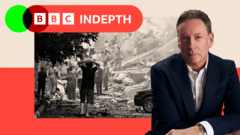**Israeli airstrikes in Tehran have resulted in the deaths of several senior Iranian military and scientific leaders, raising tensions in the already volatile region.**
**Escalation in Israel-Iran Tensions: Key Iranian Leaders Targeted in Israeli Strikes**

**Escalation in Israel-Iran Tensions: Key Iranian Leaders Targeted in Israeli Strikes**
**The recent attacks mark a dramatic shift in Israel's strategy against its Iranian adversaries, focusing on multiple high-ranking officials simultaneously.**
Amid an increasingly fraught security landscape, Israel has executed a series of airstrikes within Iran, targeting prominent military and nuclear figures. Among the casualties is Hossein Salami, the commander of Iran's Islamic Revolutionary Guards Corps, whose death has been confirmed by Iranian media. The operation marks a significant escalation in Israel's ongoing campaign to undermine Iranian military leadership.
Initial reports highlight that in addition to Salami, at least three other key figures were reportedly killed, including Gholamali Rashid, the deputy leader of Iranian armed forces, and respected nuclear scientists Mohammad Mehdi Tehranji and Fereydoun Abbasi. The unprecedented nature of this coordinated attack, focusing on multiple targets within Iranian territory, signals a strategic pivot for Israel.
Previously, Israeli operations have primarily been executed against individual targets beyond its borders, typically in neighboring Lebanon or Syria. However, these recent strikes reflect a newfound boldness in executing their objectives deep within Iranian soil, suggesting a more aggressive stance amid ongoing hostilities.
Further attacks reportedly focused on Iran’s nuclear capabilities and air defenses, indicating a comprehensive approach to diminishing Iran's regional influence and military readiness. Israeli sources confirmed the targeting of several top commanders within the Revolutionary Guards Corps, including Mohammad Bagheri, the chairman of Iran's armed forces staff; however, their current status is unverified.
As tensions rise, the implications of this military action extend beyond mere political ramifications, with both nations on high alert for potential retaliatory measures. The international community will be closely watching the developments as the situation unfolds, potentially setting the stage for further escalation in the region's complex dynamics.
Farnaz Fassihi leads UN coverage while reporting from New York, alongside Ronen Bergman, who tracks Israeli matters from Tel Aviv, and Aaron Boxerman, documenting the situation from Jerusalem.
Initial reports highlight that in addition to Salami, at least three other key figures were reportedly killed, including Gholamali Rashid, the deputy leader of Iranian armed forces, and respected nuclear scientists Mohammad Mehdi Tehranji and Fereydoun Abbasi. The unprecedented nature of this coordinated attack, focusing on multiple targets within Iranian territory, signals a strategic pivot for Israel.
Previously, Israeli operations have primarily been executed against individual targets beyond its borders, typically in neighboring Lebanon or Syria. However, these recent strikes reflect a newfound boldness in executing their objectives deep within Iranian soil, suggesting a more aggressive stance amid ongoing hostilities.
Further attacks reportedly focused on Iran’s nuclear capabilities and air defenses, indicating a comprehensive approach to diminishing Iran's regional influence and military readiness. Israeli sources confirmed the targeting of several top commanders within the Revolutionary Guards Corps, including Mohammad Bagheri, the chairman of Iran's armed forces staff; however, their current status is unverified.
As tensions rise, the implications of this military action extend beyond mere political ramifications, with both nations on high alert for potential retaliatory measures. The international community will be closely watching the developments as the situation unfolds, potentially setting the stage for further escalation in the region's complex dynamics.
Farnaz Fassihi leads UN coverage while reporting from New York, alongside Ronen Bergman, who tracks Israeli matters from Tel Aviv, and Aaron Boxerman, documenting the situation from Jerusalem.



















